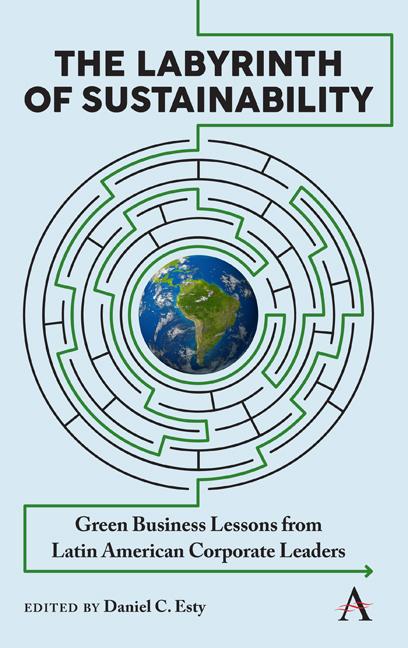Book contents
- Frontmatter
- Dedication
- Contents
- List of Illustrations
- Acknowledgments
- Notes on Contributors
- Introduction
- Chapter 1 Water Conservation in Scarcity Conditions: Corporate Sustainability at Mexico's FEMSA Group
- Chapter 2 Walmart Mexico: Clean Energy to Reduce Costs and Improve Corporate Image
- Chapter 3 Grupo Vanguardia Revitalizes Plastics Recycling in Honduras
- Chapter 4 Nissan Mexicana's Renewable Power Partnership
- Chapter 5 Tecnosol Follows the Sun
- Chapter 6 Rizek Pushes the Dominican Republic Cocoa Industry toward Sustainability
- Chapter 7 Centrosur Leads the Way to Sustainability in Ecuador
- Chapter 8 A Resilient World: Bavaria Builds Its Case on Water
- Chapter 9 Grupo Herdez Takes the Initiative in Mexico's Food Market
- Chapter 10 Chile's Las Palmas Avocado Orchard: Water Consumption Reduction in Agriculture
- Chapter 11 Mabesa: Increasing Global Competitiveness with Eco-friendly Disposable Products
- Chapter 12 Water Use Efficiency Initiatives in Nestlé's Value Chain and the Implications of the Company's Business Model
- Notes
- Index
Chapter 6 - Rizek Pushes the Dominican Republic Cocoa Industry toward Sustainability
Published online by Cambridge University Press: 29 May 2019
- Frontmatter
- Dedication
- Contents
- List of Illustrations
- Acknowledgments
- Notes on Contributors
- Introduction
- Chapter 1 Water Conservation in Scarcity Conditions: Corporate Sustainability at Mexico's FEMSA Group
- Chapter 2 Walmart Mexico: Clean Energy to Reduce Costs and Improve Corporate Image
- Chapter 3 Grupo Vanguardia Revitalizes Plastics Recycling in Honduras
- Chapter 4 Nissan Mexicana's Renewable Power Partnership
- Chapter 5 Tecnosol Follows the Sun
- Chapter 6 Rizek Pushes the Dominican Republic Cocoa Industry toward Sustainability
- Chapter 7 Centrosur Leads the Way to Sustainability in Ecuador
- Chapter 8 A Resilient World: Bavaria Builds Its Case on Water
- Chapter 9 Grupo Herdez Takes the Initiative in Mexico's Food Market
- Chapter 10 Chile's Las Palmas Avocado Orchard: Water Consumption Reduction in Agriculture
- Chapter 11 Mabesa: Increasing Global Competitiveness with Eco-friendly Disposable Products
- Chapter 12 Water Use Efficiency Initiatives in Nestlé's Value Chain and the Implications of the Company's Business Model
- Notes
- Index
Summary
Abstract
Rizek Cacao, the leading cocoa exporter in the Dominican Republic, faced complete collapse after Hurricane Georges devastated the island nation in 1998. Since cocoa beans grow best under forest cover, the threat to the industry also posed a threat to Dominican forests. However, the company regrouped, changed its strategies and, in the process, helped resurrect the industry in the Dominican Republic, which now ranks among the world's top ten cocoa bean producers. The disaster prompted Rizek Cacao to develop a best practice for the industry, the formation in 2001 of FUPAROCA, the Foundation for Social Assistance, Recovery, and Management of Organic Cocoa Plantations. As a nonprofit organization, FUPAROCA operates under the umbrella of Rizek Cacao but is run independently from the company. The flagship social responsibility initiative of Rizek Cacao, FUPAROCA is managed by 4,000 independent cocoa growers. The organization promotes capacity building, education, and technical support to improve production of cocoa certified as organic, advocate sustainable farming practices, and provide the highest quality production standards in the industry. These practices have expanded organic cocoa production, supported environment and forest protection, and bolstered the quality of life of cocoa growers and their families. FUPAROCA has also transformed Rizek's public image, increased its revenues, and improved consumer brand loyalty.
Introduction
Hurricane Georges swept through the Dominican Republic in September 1998, devastating the country's cocoa production. Almost two-thirds of cocoa crops were destroyed by the storm and its aftereffects. Rather than fold and walk away, Rizek Cacao, the leading cocoa exporter in the country, saw opportunity amid the crisis. Out of the devastation rose a new strategic awareness for the company, summed up by Hector Rizek, president of Rizek Cacao, who asked his management team, “What will we do? Where are we headed? How do we protect ourselves from a future economic turndown?”
Rizek Cacao's Best Practice
In 2001, Hector Rizek's team responded by forming the Foundation for Social Assistance, Recovery, Management of Organic Cocoa Plantations, known by its Spanish acronym FUPAROCA. Organized as a nonprofit, FUPAROCA operates under the umbrella of Rizek Cacao but is managed independently from the company.
- Type
- Chapter
- Information
- The Labyrinth of SustainabilityGreen Business Lessons from Latin American Corporate Leaders, pp. 81 - 90Publisher: Anthem PressPrint publication year: 2019

